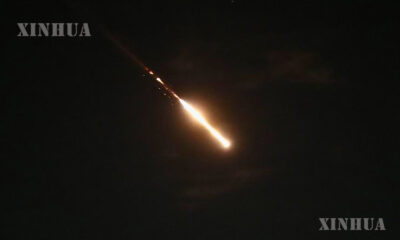International Organizations
အစ္စရေးသုတေသီများက ခုခံအားဆဲလ်များသည် ဦးနှောက်ကင်ဆာအား ပိုမိုပြင်းထန်စေနိုင်ကြောင်းတွေ့ရှိ

ဂျေရုဆလင်၊ အောက်တိုဘာ ၅ ရက် (ဆင်ဟွာ)
လူ့ခန္ဓာကိုယ်ရှိ ကိုယ်ခံအားစနစ်ဆဲလ်များသည် ကင်ဆာကျိတ်များ ပျံ့နှံ့ခြင်းနှင့် ပိုမိုပြင်းထန်ခြင်း ဖြစ်ပွားစေနိုင်သည်ကို အစ္စရေးသုတေသနပညာရှင်များက တွေ့ရှိခဲ့ကြောင်း အစ္စရေးအလယ်ပိုင်းရှိ Tel Aviv University (TAU) က အောက်တိုဘာ ၄ ရက်တွင်ထုတ်ပြန်ခဲ့သည်။
ယင်းတွေ့ရှိချက်အရ ကင်ဆာရောဂါတိုက်ဖျက်ရေးအတွက် အထူးသဖြင့် ဆိုးဝါးသော glioblastoma ခေါ် ဦးနှောက်(သို့မဟုတ်) ကျောရိုးနာ့ဗ်ကြောတွင်ဖြစ်ပွားတတ်သောကင်ဆာ တိုက်ဖျက်ရေးတွင် အထောက်အကူပြုနိုင်ကြောင်း TAU မှ မှတ်ချက်ပြုခဲ့သည်။
TAU သုတေသနပညာရှင်များက ပုံမှန်ကိုယ်ခံအားစနစ်ရှိသော တိရစ္ဆာန်များ၌ glioblastoma ခေါ် ဦးနှောက်(သို့မဟုတ်) ကျောရိုးနာ့ဗ်ကြောတွင်ဖြစ်ပွားတတ်သောကင်ဆာ အကျိတ်များဖြစ်ပေါ်ပုံအား လေ့လာခဲ့ကြောင်း Cell Reports ဂျာနယ်တွင် ယင်းတွေ့ရှိမှုအားဖော်ပြခဲ့သည်။
တွေ့ရှိချက်အရ neutrophils ဟုခေါ်သည့် ခုခံအားစနစ်ဆဲလ်၏ ၎င်းတို့အဓိကတာဝန်မှာ အကျိတ်အားခြိမ်းခြောက်မှု “နှစ်ဆဖန်တီးမှု’’ လုပ်ဆောင်သည့် ကင်ဆာဆဲလ်များအားသတ်ရန်ဖြစ်ကြောင်း သိရသည်။
neutrophils သည်ကနဦးတွင် အကျိတ်ကိုတိုက်ထုတ်သော်လည်း၎င်းတို့သည် အချိန်ကြာလာသည့်နှင့်အမျှ ကင်ဆာနေရာတွင် အကျိတ်ဖြစ်ပေါ်စေရန် အကျိတ်ဖွံ့ဖြိုးမှုအားထောက်ပံ့ကြောင်း၊ ပျက်ဆီးမှုအားပိုမိုဆိုးရွားစေကြောင်း သိရသည်။
ထို့ပြင် အကျိတ်သည် ဦး နှောက်တွင်ရှိနေသော်လည်း neutrophils များသည် ၎င်းတို့၏ဂုဏ်သတ္တိကိုပြောင်းလဲစေသောဖြစ်စဉ်အရ ၎င်းတို့စတင်ခဲ့သောရိုးတွင်းချဉ်ဆီနေရာဖြစ်သောအဝေးမှပင် နေရာယူနိုင်ကြောင်းသိရသည်။
တွေ့ရှိချက်အသစ်များသည် ခုခံအားကုထုံးများကိုမီးမောင်းထိုးပြနိုင်သည်ဟုသုတေသီများကမှတ်ချက်ပြုသည်။
“ဒီတွေ့ရှိချက်တွေကခုခံအားစနစ်နဲ့အကြမ်းဖက်ကင်ဆာအကျိတ်တွေကြားအပြန်အလှန်ဆက်သွယ်မှုယန္တရားကိုဖော်ထုတ်ရန် ပထမခြေလှမ်းဖြစ်နိုင်တယ်”ဟုပညာရှင်များက ကောက်ချက်ချခဲ့သည်။ (Xinhua)
————————————
(English Version)
Israeli research finds immune cells may intensify brain cancer
JERUSALEM, Oct. 4 (Xinhua) — Israeli researchers have found that immune system cells in the human body may intensify the spread and aggressiveness cancerous tumors, Tel Aviv University (TAU) in central Israel said on Monday.
This discovery may help the war against cancer, in particular fighting the deadly glioblastoma brain cancer, TAU noted.
In a study, published in the journal Cell Reports, TAU researchers examined the development of glioblastoma tumors in animals with a normal immune system.
The findings showed that immune system cells called neutrophils, that their primary function is to kill the cancer cells, act as “double agents” that increase threat of the tumor.
It turned out that neutrophils first fight the initial tumor, but over time they are recruited to the cancerous area and begin to support the tumor development, aggravating the damage it created.
Moreover, the process by which the neutrophils change their properties can take place remotely, even in the bone marrow where they originate, although the tumor is in the brain.
The new findings may also shed light on immunotherapeutic therapies, the researchers noted.
“These revelations could be the first step towards deciphering the mechanism of interaction between the immune system and violent cancerous tumors,” they concluded. Enditem






